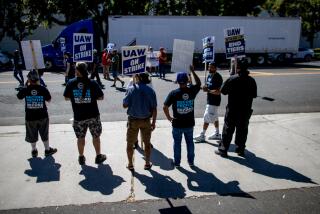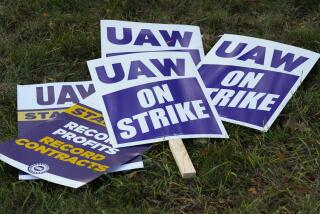Not much horsepower
ONCE UPON A TIME, if the chief executives of the Big Three U.S. automakers wanted a meeting with the president, he would rearrange a few summits or travel to Detroit to accommodate their schedules. Not anymore.
After months of lobbying for some face time with President Bush, the heads of General Motors, Ford and DaimlerChrysler’s Chrysler Group finally got their wish Tuesday -- after the election, at a time when the president’s political power is at a low point. Bush met with the CEOs for about an hour in the Oval Office. The president smiled, said a few nice things to the cameras about the importance of the U.S. auto industry and sent them on their way. Very little, if anything, is expected to come of the meeting.
It was a reflection not only of the newfound weakness of the industry but of a change in global circumstances. The lines separating U.S. from foreign automakers are a lot blurrier than they used to be. DaimlerChrysler, still considered one of the giants of Detroit, is headquartered in Germany. Toyota and Honda might be based in Japan, but they own numerous U.S. factories and employ thousands of American workers.
The executives weren’t looking for a bailout, but they were hoping for some assistance from Washington. At the top of their agenda was healthcare. If they want help on that, they’ll have to get in line. It is inarguable that the automakers face crushing healthcare costs, but it is the entire U.S. healthcare system that is in desperate need of an overhaul. The auto industry’s problems differ only in scale.
Also up for discussion Tuesday was the Japanese yen, which Detroit has long complained is undervalued, and alternative fuels -- the CEOs were apparently seeking more subsidies to build flex-fuel cars that can burn either gasoline or an ethanol blend. Bush wisely failed to take the bait on the yen, whose value is determined by market forces and not by the machinations of the Japanese government or its automakers. And although Washington should be encouraging more flex-fuel cars, Detroit could also focus on improving the gas mileage of conventional vehicles.
The U.S. auto industry is an important part of the nation’s economy. But this is one road the Big Three are going to have to steer on their own. The days of massive federal bailouts for the likes of Chrysler are over -- and would be even if it were still an American company.






